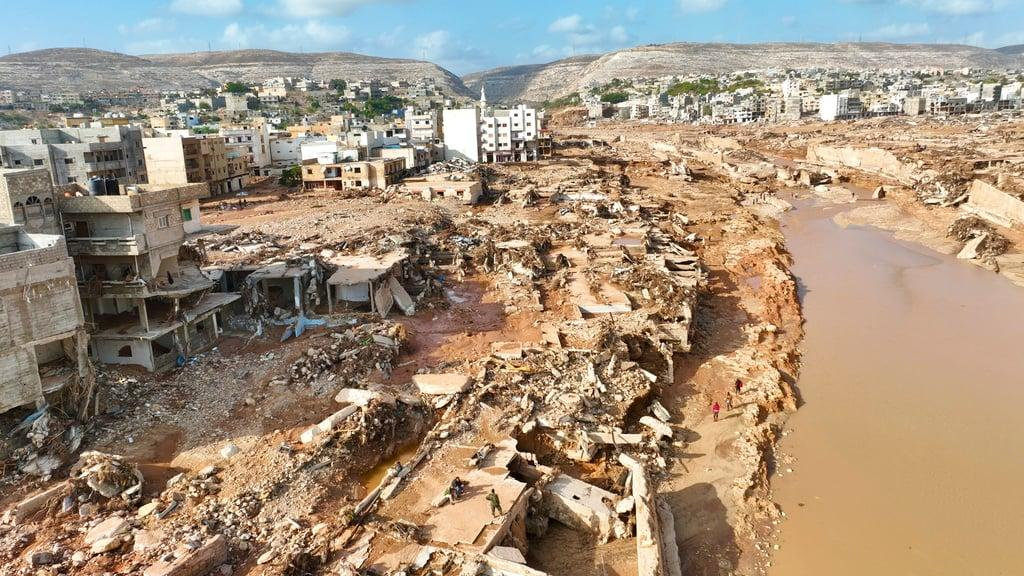Since its inception in 1993, Islamic Relief USA (IRUSA) has been committed to emergency relief, delivering meals, clean water, hygiene kits, and other essentials to people in need following major disasters.
Among other countries in the Middle East and North Africa (MENA) region, IRUSA has a long history of supporting Libya during crises and periods of political unrest. It is currently focused on long-term development aid in the country after having contributed to immediate relief efforts following Storm Daniel which, in September 2023, killed thousands of people and destroyed critical infrastructure.
The Deadliest Flood in Africa’s Recorded History
A Mediterranean tropical-like cyclone, Storm Daniel was the deadliest of its kind in recorded history. While several people died during the early stages of the storm in Greece, Turkey, and Bulgaria, Libya was hit the hardest as the storm intensified and hit land near Benghazi on September 10. More than 5,900 people died before the storm dissipated two days later, while flooding and high winds swept away entire neighborhoods and destroyed critical infrastructure that had already been in a weakened state due to the Libyan civil war.
The death toll from Storm Daniel in Libya alone made it the most disastrous single flooding event in African history, exceeding a flood in Algeria in 1927 that caused 3,000 deaths. Derna and surrounding areas were hit hardest after extensive rainfall and flooding resulted in the collapse of the Derna and Mansour dams, releasing about 24 million cubic meters of water. Roughly 30,000 people were displaced and nearly 900 of Derna’s 6,000-plus buildings were completely destroyed.
Flooding also made it difficult to find displaced persons over the next few days. Naval and international diving teams reportedly found bodies more than 60 miles from Derna, while activist Mohammad Shteiwi, who was on the ground during rescue operations, told CNN that he “counted at least 200 bodies that were washed up on the shore.”
Impact of the Civil War
While the storm did intensify as it hit Libya, the damage—and death toll—would not have been as substantial if the country’s infrastructure, particularly its dams, had been in good condition. The dams had allegedly been significantly damaged during a storm in 1986 and were neglected in subsequent years. Following the overthrow and death of Muammar Gaddafi in 2011, Derna was a critical battleground in the civil war and changed hands four times until the end of the war in 2020. Many other buildings in Derna and throughout the country were also destroyed or partially damaged during the civil war.
Libya had reportedly allocated 2 million euros to go toward dam repairs and hired a Turkish firm in 2010 to perform the work. The company halted its work after just a few months due to the outbreak of the Libyan revolution the following year. In the aftermath of the storm, Al-Seddik al-Sour, Libya’s prosecutor general, investigated 16 people for their roles in the ineffective maintenance of the dams. Several were arrested, including the country’s head of water resources, and Derna mayor Abdulmonem al-Ghaithi, who was detained on suspicion of “abuse of power and bad management of funds allocated to city development.”
IRUSA’s Immediate Response
As it has for several other disasters, IRUSA acted quickly in response to Storm Daniel, working with local partners to provide emergency aid, including food and other necessities to families in need. It provided 39,000 hot meals, 4,100 blankets, 4,100 mattresses, 1,100 pairs of shoes, 1,100 hygiene kits, 600 food kits, 220 portable cookstoves, and 6,900 liters of drinking water, among other items. All this aid was made possible by IRUSA’s generous donors and the work of the organization’s dedicated staff and volunteers.
Long-Term Relief Efforts
One year after the devasting flooding, IRUSA is now dedicated to long-term relief in Libya. The country is still feeling the impact of the storm, and its economy has suffered in recent years due to a combination of factors, including the COVID-19 pandemic, the Russia-Ukraine war, and political volatility. Libya has one of the highest rates of youth unemployment in the world and is home to over 616,000 refugees and more than 75,000 internally displaced people.
Storm Daniel has exacerbated economic and societal issues in Libya, with many people still lacking access to basic services, including housing, education, and healthcare. IRUSA is committed to bringing these services to as many people as possible via interventions such as food aid and the construction of water wells to ensure more communities have access to clean drinking water.
How to Donate to IRUSA’s Libya Relief Efforts
To learn more about IRUSA’s relief efforts in Libya, visit irusa.org/middle-east/libya. While the Libya fundraising campaign has been temporarily paused, supporters can choose to donate to other humanitarian causes in the Middle East and North Africa via the “quick donate” bar on the bottom of the page.

Leave a Reply